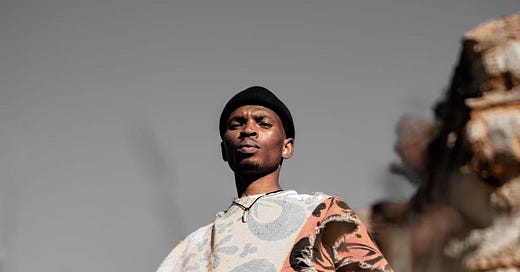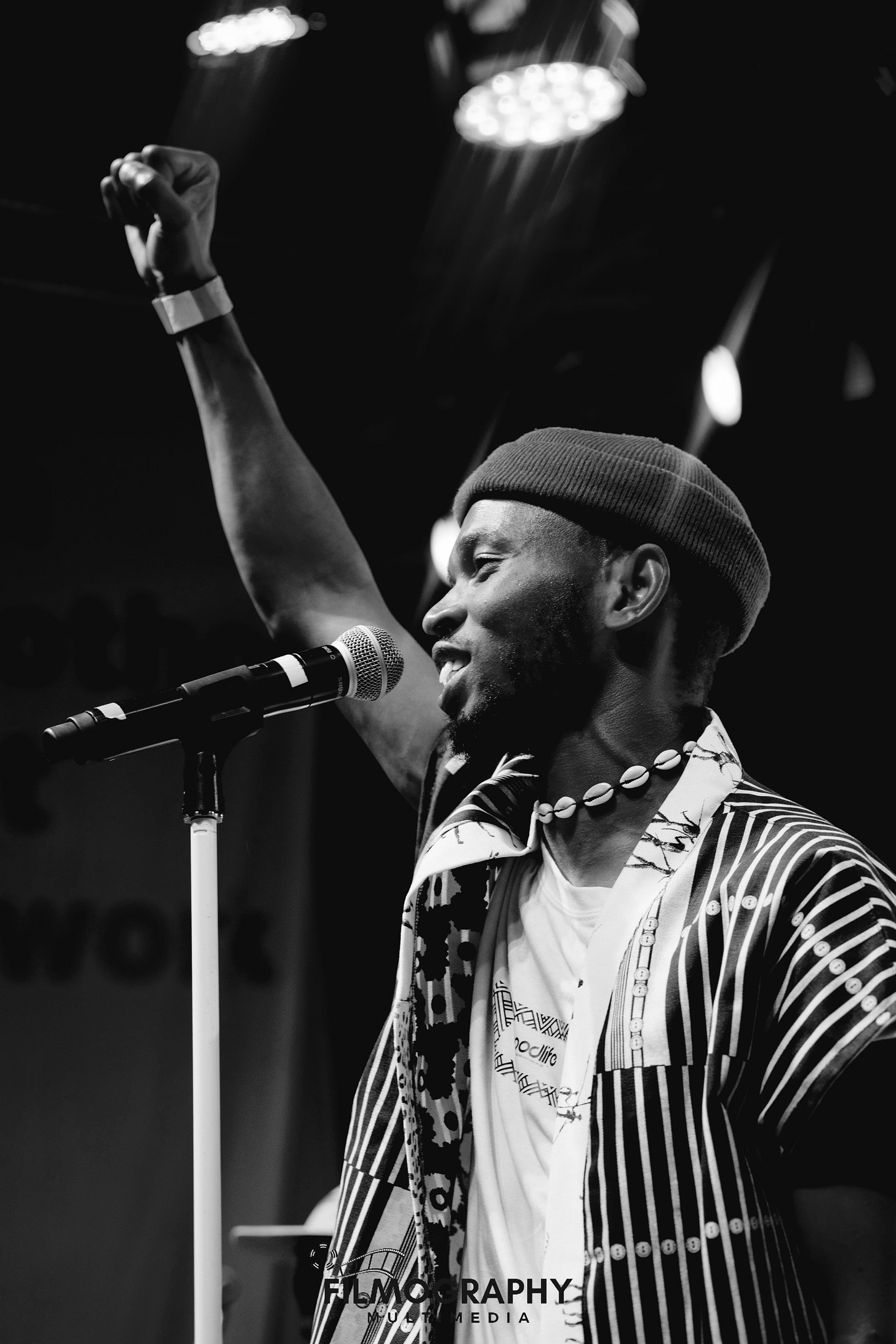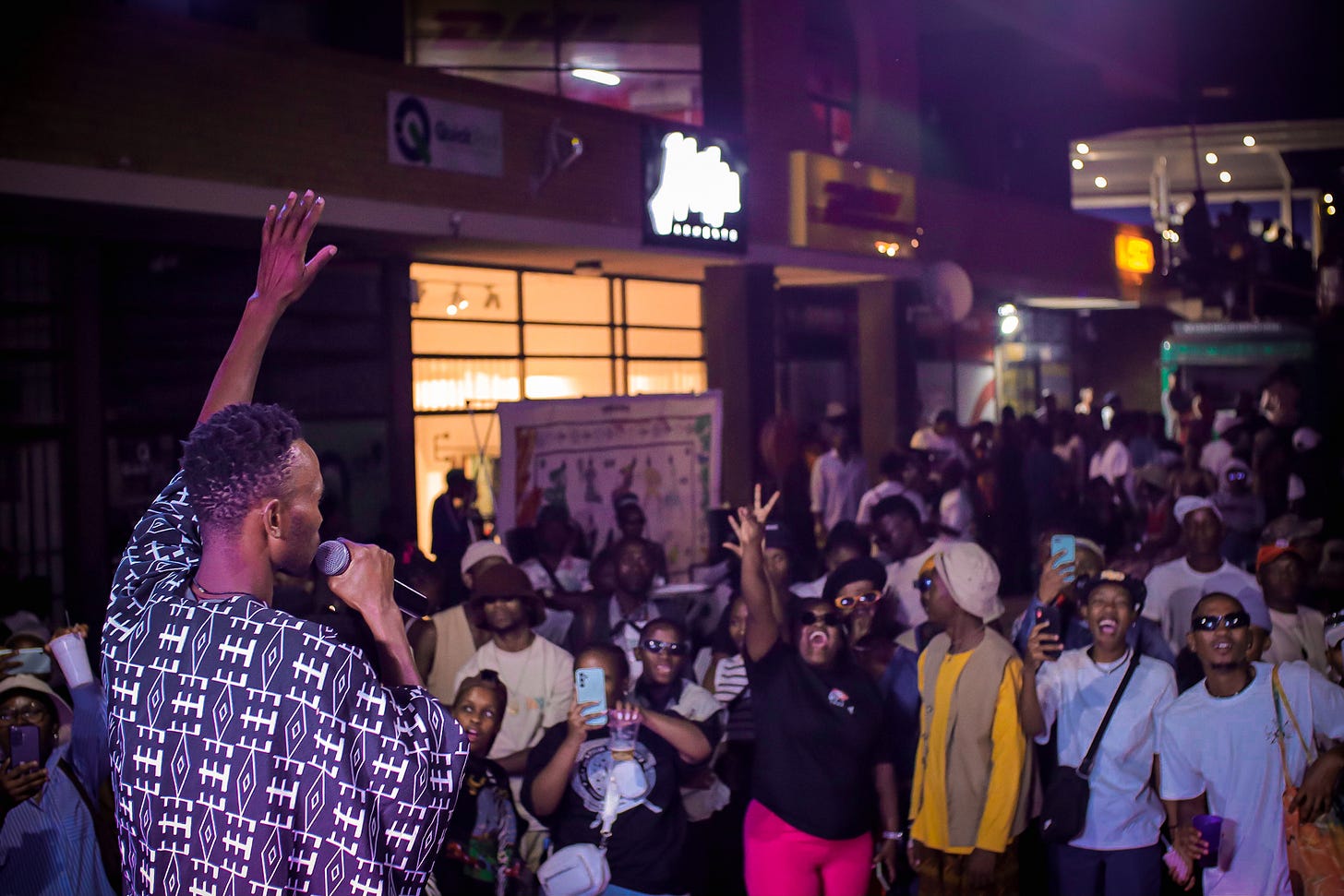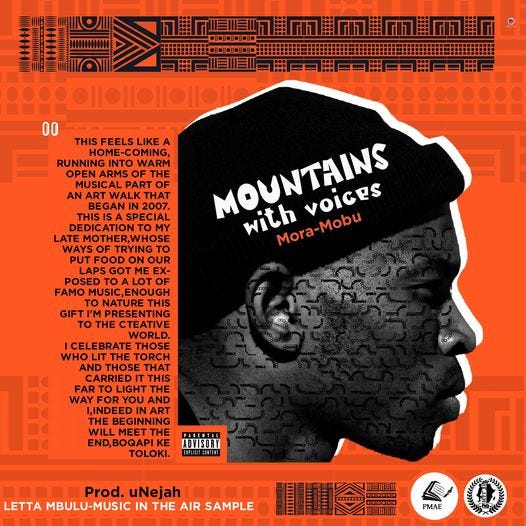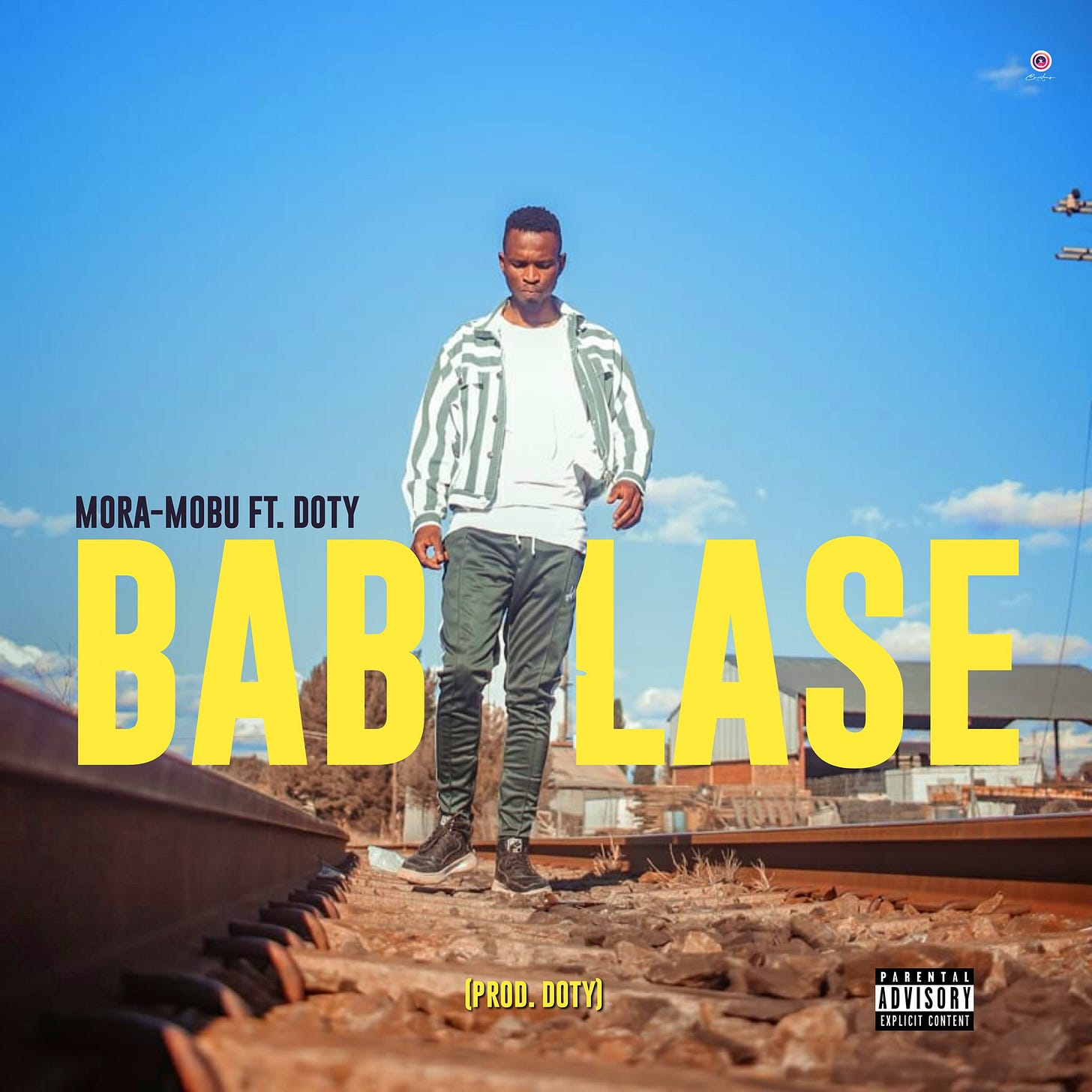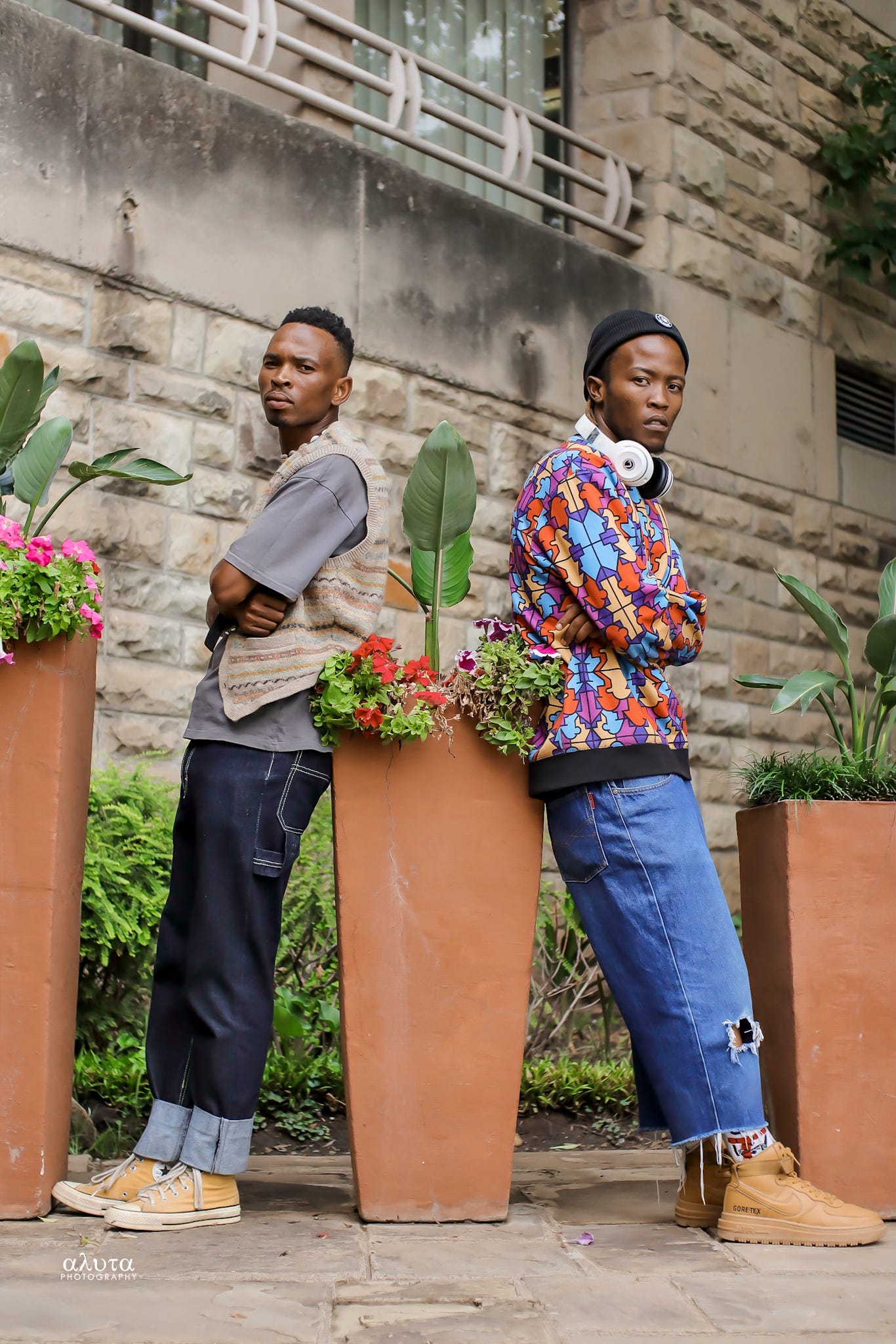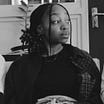Sounds of Home, a subsection of our newsletter in which we highlight fresh music from Lesotho through candid interviews with our local musicians and music compilations for your listening pleasure.
This third instalment of the Sounds of Home series features Poet and Storyteller, Thabo Marebole, known amongst many as Mora-Mobu.
Music is deeply woven into his relationship with poetry and you will learn in this interview that both artforms trace all the way back to his childhood — a testament to the commitment and passion he has poured into his craft over the years.
Today, Marebole’s poetry performances co-exist beautifully with the soulful productions and dynamic voice of musician and producer, Thabiso Doti. While also being independent artists, the duo have officially come together to reimagine Mora-Mobu as a collective.
Reflecting on the inspiration behind his 2021 debut single ‘Mountains with Voices’ that celebrates art and creativity in Lesotho, Marebole says:
"People will look at our mountains and then hear music coming from behind them and they will think “These mountains have voices!”"
This is a sentiment that he truly believes in — that this mountainous kingdom of ours is blessed with powerful voices. And Marebole is committed to making the world hear them. Just last month, in downtown Maseru, Mora-Mobu held the first of what he calls Ha e Art.e open mic sessions for poets and musicians. And for the past four years, he has successfully organised the annual Mora-Mobu Poetry Sessions which bring people together to experience live poetry and music performances. Don’t miss the next one coming up this November!
This is not all. Earlier this year, Marebole also organised Market oa Kasi, a flea market in Naleli where creatives from neighbouring villages showcased their products, skills and talents.
All this to say, it is clear that Thabo Marebole is a creative leader at heart. This young man from Koalabata carries what I think is a heartfelt vision of the transformative power of art for Basotho. I see someone who is committed to pursuing art not only for self but for others too. And this is truly commendable.
I hope you get to know him better through this interview. Enjoy!
Where did your relationship with poetry begin?
My relationship with the creative space started with theatre. In primary school, I was always the youngest in theatre groups so I could not always play roles. But in 2007, when I was in high school, I joined the school theatre and was one of the two actors that performed in a two-man play. It was so beautiful that the creative director, who I think he realised my potential, took me under his wing.
He taught me so much. I loved his style of poetry. I think 90% of my style is inspired by him. Everything I needed to learn about poetry was from him. Then, I could not yet write my own poetry but I was a very good performer. So he would write poems for me that I would rehearse and perform in theatre and poetry competitions. These competitions were hosted by NCO theatre group, it’s just unfortunate that the group fell off.
I remember in 2008, I wrote my first poem! It was called “The Great Flood”. In it, I talked about a flood of great African women, who are taking over and changing gender narratives. It celebrated women.
From then onwards, I joined competitions even after high school. I won the Molengoane Poetry Competition, which was held at Molengoane Lodge. I remember one of the guests was Ntsiki Mazwai. It was my first time seeing her and I got to listen to her perform her poetry and I was so inspired by it.
I have written and I’ve never looked back since!
It’s amazing to hear about how far back you go with poetry and that you were a performer before you were a poet.
What’s the name of this creative director who took you under his wing and from whom you learned so much? Re mo tlotle! Do you still maintain a relationship with him to date?
Thank you so much. His names are Tšeliso "Molomo-Monate" Moima. And yes I still keep in touch with him. I still want to invite him to one of my performances one day.
What does music mean to you? What is your relationship with music?
Music is so special to me. Very close to my heart. At age 6, I was part of a Famo band! Ke ne ke letsa moropa. I used to do vocal backings too. The singers were Ntate Phanche le bo-Ntate Kent. Since then, I fell in love with music.
Heso ho ne ho rekisoa joala ba Sesotho - batho ba ne ba tla le licassettes tsa bona hore li tlo letsoa ha ba ntse ba lutse, ba noa, So I’d hear different music, different dimensions of Famo, different poetry styles. Ka qala ho hlalohanya hore ba koana ba ipolela tjena, eo ke utloang a bina hamonate ke a binang tjena, and I think all this brought me closer to music. Also, we sang a lot in our high school theatre plays. In fact, students that usually won at competitions were those whose plays had a lot of singing.
So, because of all these experiences, I could link music to emotions from a very early age.
When I could not go to varsity after high school, I was usually alone when my peers had gone to uni and music became my best friend. This is when I learned which genres I liked - what kind of content I liked consuming. And that’s the type of content I am writing, reading and performing today. Music is very close to my heart. It’s an escape. It’s a safe space for me. It’s like meditation. You are just there in your feelings and thoughts - and you also get consumed in someone else’s thoughts, emotions and feelings and it's very beautiful.
And now, doing my own songs is very special. It’s how I get to express myself. It’s how I get to prove to myself that the path that Life chose for me — of growing into a family in which strangers would come and express themselves through music — was all meant to be.
I can hear from the tone in your voice that music truly means a lot to you! And that you’ve grown up with it in a way. You mentioned that you listened to so much music and that it has shaped your poetry. So I am very curious, who are these artists that you listen to today, genres that you pull from today, that pour into you, that help you become the Mora-Mobu that everybody knows?
I am inspired by different sounds. I easily connect with conscious content and rhythm.
Having grown up in a Famo setting, I draw much inspiration from Famo’s lyrics, rhythms and recitations. Then there's jazzy sounds, along with the legendary Sankomota compositions. Ke rata lipina tsa bahale haholo, tsa marena le bahlabani ba fetileng.
You released “ Mountains with voices” in 2021. What was the inspiration behind this track? And was this your first public fusion of music and poetry?
Mountains with Voices! Yes! If you listen closely, it samples Mme Letta Mbulu’s “Music in the Air”. Pina eno esale ke e rata haholo! And I always told myself that if I am to do music, it will be that kind of music! The kind of melodies that sound like you've heard them before even though it’s your first time hearing them. The kind of music that resonates with calmness, a space of celebration, a happy space.
Letta Mbulu ’s soothing “There is Music In The Air” - the sonic inspiration in Mora-Mobu’s “Mountains with Voices”
“Mountains with Voices” is a poem that celebrates creativity in Lesotho.
It celebrates creating in a land that has all these challenges but being able to rise above the noise, rise above the doubts, ebe re khona ho qapa lithothokiso, lipina, re take, re ngole. It celebrates people that create, people that have held the torch for us, for us to see the light, that there is light at the end of this tunnel that we are in.
I think that is the space that I wrote this poem from. Ha e tloha feela e re:
“ Ntate Forere o otlantse thupa le lejoe makaoteng,
ha utloahala molumo matšekheng
and that was the beginning of our sound . . .”
When you go through the history of Famo, ho thoe Ntate Forere Motloheloa, may his soul rest in peace, eena le e mong oa bana babo, ke sa re, ba ile ba theha sehlopha sa famo, ba le koana merafong.Ba bina ha ba le joaleng, ha ba le lekeisheneng, ba binela batho. Merabe e meng e ne bina mmino ea bona, so they had to come up with a sound that was their own, and Famo came about. Ba ne ba ipitsa Tau ea Matšekha.
“. . . Famo ke lentsoe la Tau ea Matšekha.
Haeso Lesotho lithaba lia bina . . .”
Kamor’a lithaba tsena, tseo ho bonahalang eka lefatše le re tseba ka tsona feela, ho na le lipina, ho na le liqapi, ho na le liroki. There is talent. Ho na le bokheleke. This piece celebrates Lesotho’s talent. People will look at our mountains and then hear music coming from behind them and they will think “These mountains have voices!”
“Mountains with Voices” was my first offering that fused poetry and music.
How is music connected to your poetry? Do you view them as two different art forms or maybe as two sides of the same coin?
Ke lia-thoteng li bapile. Ekare lia khakeletsana. They are linked. A song can inspire you to write a poem or a poem can be fused into a song, you see. I could say one goes in one direction and one goes in another, but they move at the same wavelength if you get me.
I am really curious about your collaborations with musician and producer, Doty. You co-create and perform a lot of sets together, blending both music and poetry together. I got to witness you two perform together at Ha e Art.e - the open mic you hosted some weeks back. How did this creative partnership begin and where does the synergy between you come from?
Doty and I first met at Rockview, at Origin Musiq’s debut single launch. He was one of the photographers at this launch. While I was on stage, I could he see that he was interested in our performance because he took pictures of us. Afterwards, on social media, I made a post about the event, and he commented and I immediately remembered him. He told me he'd like to produce some of my material. We met and worked on Babalase, the second single that I released.
From there, whenever I had corporate gigs to perform adverts, he was the guy that I reached out to, he was easily accessible, he really understood the sound that I wanted to push, and I loved his singing.
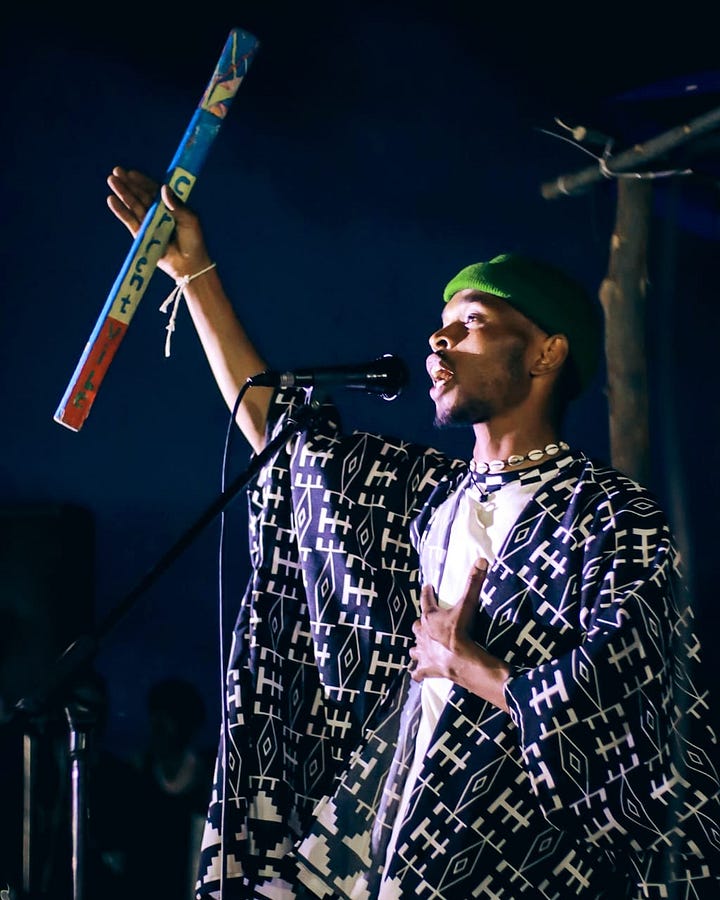
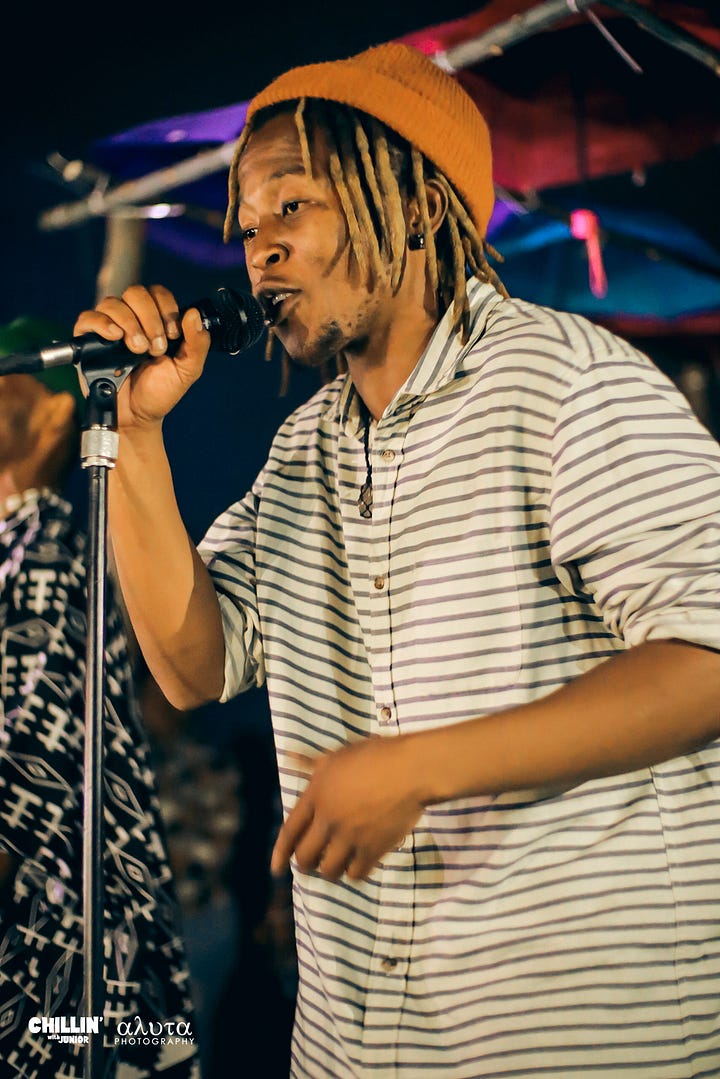
Time went by, and we got to perform Babalase together for the first time. Since then we’ve performed a lot together until we decided: let's make this a two boy band called Mora-Mobu, eskaba nna feela, e be lebitso la sehlopha sa rona. And since then, it's been very beautiful!
Potso ea ka ho qetela-qetela. I came across a question that I really liked and I want to ask it to you : if you had the entire world's attention for 1 minute, what would you say?
"Ke kopa tsohle tse ntle, tse re kopantseng maobane le kajeno li re kopanye hape le kamoso. May we all experience kindness in its purest form."

